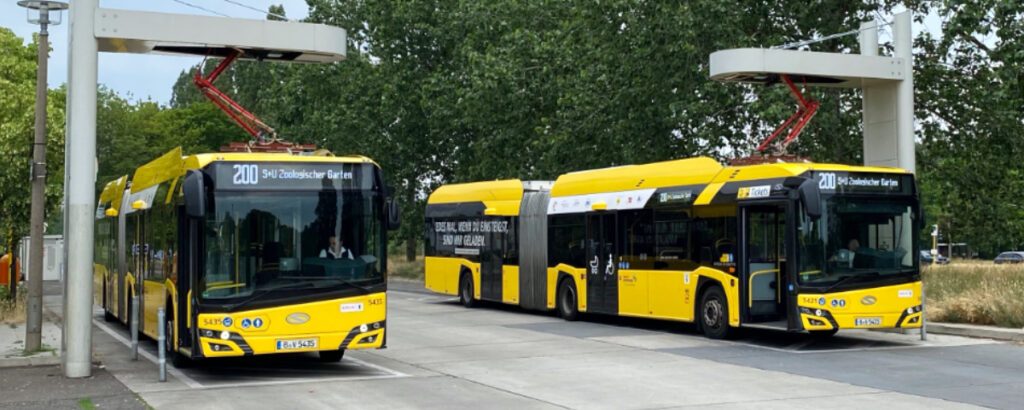17 articulated buses with electric drive for Berlin: E-MetroBus project presents results
June 21, 2023 | In the E-MetroBus project, the Berliner Verkehrsbetriebe (BVG), together with TU Berlin and Reiner Lemoine Institute, have integrated 17 articulated buses with battery-electric drive into their fleet. The quiet, zero-emission buses now run primarily on the project line 200 between Hertzallee and Michelangelostrasse. They thus replace a total of 17 diesel vehicles in operation and have saved around 3,200 t of CO2 as well as around 400 kg of NOX during the project period between January 2019 and December 2022 alone.
The E-MetroBus project was funded by the Electromobility Funding Guideline of the German Federal Ministry of Digital Affairs and Transport with 5.6 million euros (1.4 million euros for research and development, 4.2 million euros for the procurement of buses and charging infrastructure). The funding directive is coordinated by NOW GmbH and implemented by the Project Management Jülich (PtJ). On June 19, the official project closing took place with all project partners.
Kurt-Christoph von Knobelsdorff, CEO and spokesman of NOW GmbH: “The conversion of public transport to emission-free drives is a mammoth task. R&D projects like E-MetroBus are enormously valuable here: practical experience, scientifically accompanied and processed, helps all those transport companies facing the procurement, installation and use of e-buses and the associated infrastructure – and the industry in the development of a market-driven offering.”
Dr. Daniel Hesse, Head of Staff Department Technology & Innovation and Program Manager Electromobility at BVG: “We are delighted with the successful completion of the E-MetroBus project as a major milestone on the way to the electrification of BVG’s entire bus fleet by 2030. The insights gained from this research project are groundbreaking for the decarbonization of our bus fleet in the coming years – at our depots, but also in the implementation of charging infrastructure throughout the city.”
On the way to converting from diesel to battery-electric propulsion, the project partners worked on numerous challenges and developed solutions from which transport operators in other cities can also benefit in the future:
- In order to be able to charge the buses effectively during short break times, fast chargers, so-called top-down pantographs with an output of more than 300 kilowatts, were installed at the two terminal stops. These can be used to temporarily charge the vehicles, allowing them to be in operation for 24 hours.
- Flexible charging times compensate for delays and detour in Berlin’s busy city traffic,
- the circulation schedules, i.e. the distance that a single bus has to travel per day, have been adjusted only very slightly for the electric articulated buses,
- a fast-charging technology was developed and tested that does not place too great a burden on the local power grid.
In the comprehensive accompanying research for the project
- developed an operating and energy supply concept that allows local integration of renewable energy generation and storage into a network of electric bus charging stations as well as into an e-bus depot – an open-source planning software derived from this to support fleet electrification will soon be made available;
- as well as work on effective air conditioning for the buses – because saving energy here is an important lever for increasing the range. The measurement campaign, which was accompanied in Berlin by a survey of passengers, has already been carried out by analogy in several major European cities and has also generated important findings there.
In the follow-up project E-bus 2030+, the findings will be extended to an overall conversion of the fleet to E-buses. In order to make the accompanying research taking place in this project transferable to as many use cases as possible, the consortium will involve various transport operators.
Further information on the project can be found here.
Further R&D-projects can be found here.
